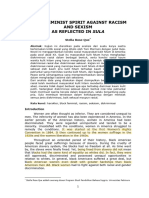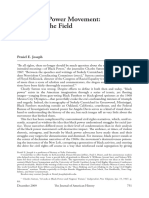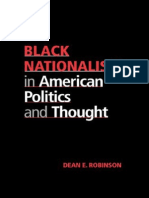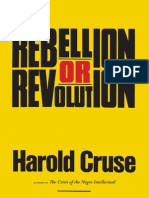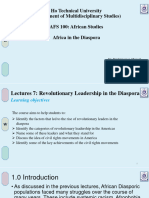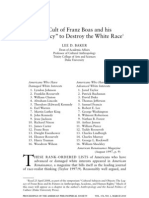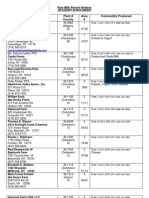0 ratings0% found this document useful (0 votes)
15 viewsBlack Studies
Black Studies
Uploaded by
Awara FalahBlack Studies is an interdisciplinary field that explores the history, culture, literature, politics, and social issues related to African diaspora communities globally. It emerged in the 1960s during the Civil Rights Movement to provide a comprehensive understanding of black experiences and challenges. Key figures who advanced Black Studies include Nathan Hare, who helped establish the first Black Studies program, and W.E.B. Du Bois, whose works explored racial inequality. Literary contributors include Toni Morrison, James Baldwin, and Zora Neale Hurston, whose novels analyzed themes of identity and oppression.
Copyright:
© All Rights Reserved
Available Formats
Download as PPTX, PDF, TXT or read online from Scribd
Black Studies
Black Studies
Uploaded by
Awara Falah0 ratings0% found this document useful (0 votes)
15 views27 pagesBlack Studies is an interdisciplinary field that explores the history, culture, literature, politics, and social issues related to African diaspora communities globally. It emerged in the 1960s during the Civil Rights Movement to provide a comprehensive understanding of black experiences and challenges. Key figures who advanced Black Studies include Nathan Hare, who helped establish the first Black Studies program, and W.E.B. Du Bois, whose works explored racial inequality. Literary contributors include Toni Morrison, James Baldwin, and Zora Neale Hurston, whose novels analyzed themes of identity and oppression.
Original Description:
PowerPoint presentation on Black Studies
Copyright
© © All Rights Reserved
Available Formats
PPTX, PDF, TXT or read online from Scribd
Share this document
Did you find this document useful?
Is this content inappropriate?
Black Studies is an interdisciplinary field that explores the history, culture, literature, politics, and social issues related to African diaspora communities globally. It emerged in the 1960s during the Civil Rights Movement to provide a comprehensive understanding of black experiences and challenges. Key figures who advanced Black Studies include Nathan Hare, who helped establish the first Black Studies program, and W.E.B. Du Bois, whose works explored racial inequality. Literary contributors include Toni Morrison, James Baldwin, and Zora Neale Hurston, whose novels analyzed themes of identity and oppression.
Copyright:
© All Rights Reserved
Available Formats
Download as PPTX, PDF, TXT or read online from Scribd
Download as pptx, pdf, or txt
0 ratings0% found this document useful (0 votes)
15 views27 pagesBlack Studies
Black Studies
Uploaded by
Awara FalahBlack Studies is an interdisciplinary field that explores the history, culture, literature, politics, and social issues related to African diaspora communities globally. It emerged in the 1960s during the Civil Rights Movement to provide a comprehensive understanding of black experiences and challenges. Key figures who advanced Black Studies include Nathan Hare, who helped establish the first Black Studies program, and W.E.B. Du Bois, whose works explored racial inequality. Literary contributors include Toni Morrison, James Baldwin, and Zora Neale Hurston, whose novels analyzed themes of identity and oppression.
Copyright:
© All Rights Reserved
Available Formats
Download as PPTX, PDF, TXT or read online from Scribd
Download as pptx, pdf, or txt
You are on page 1of 27
Black Studies
Prepared by
Erfan K.Abdullah Dlshad Muhamad
Mahmood
Supervised by Dr.Rebwar Z. Mohammed
Overview
Other Names Of Black Studies.
Definitions
Aims.
History of Black Studies
Key Figures
Literary Works
Examples and Videos
What is Black Studies?
1. Black Studies is an interdisciplinary field that explores the history,
culture, literature, politics, and social issues related to people of
African descent. It aims to provide a comprehensive understanding of
the experiences, contributions, and challenges faced by black
communities globally.
2. Black studies is an academic discipline that explores the social,
political, economic, and cultural aspects of the African diaspora,
with a focus on illuminating the diverse experiences and perspectives
of black people, their communities, and their impact on society.
Black Studies emerged as both an intellectual field and a
critical ideology during the 1960s. It has remained close to its
roots and also made a broad and deep impact on scholarship
in general by creating a fundamental shift in the way scholars
pursue research and view human societies: Black Studies has
made possible an awareness of the great contributions that
Africans and those of African descent have made to the
discourse of knowledge.
Other Names of Black Studies
1. African American studies
2. Africana studies
3. Afro-American studies
4. African diaspora studies (
5. Pan-African studies
6. African and African diaspora studies
7. Black and African studies
8. African and African American studies
9. Black cultural studies
10. Black history and culture studies
When did it start?
What was the cause?
Key Figures
Nathan Hare:
Activist, psychologist, and professor /Co-founder of the Black Studies movement in the US
Believed in African Americans controlling their education and studying their history and
culture
Helped establish the first Black Studies program at San Francisco State University in 1968
Fought against racial discrimination in employment, education, and housing
Author of books and articles on race, psychology, and education "The Black Anglo-Saxons"
- Worked as a professor at institutions like San Francisco State University, Stanford University,
and Howard University
- His contributions have had a significant impact on African American studies and discussions
on race and education in the US.
1. W.E.B. Du Bois - "The Souls of Black Folk"; "Black Reconstruction in America"
2. Angela Davis - "Women, Race, and Class"
3. Malcolm X - "The Autobiography of Malcolm X"
4. Bell Hooks - "Ain't I a Woman?"; "Killing Rage: Ending Racism"
5. Cornel West - "Race Matters"; "Black Prophetic Fire"
6. Ida B. Wells - Various investigative journalism pieces on racial violence
7. Carter G. Woodson - "The Mis-Education of the Negro"
8. Toni Morrison - "Beloved"; "Song of Solomon"
9. Octavia Butler - "Kindred"
10. John Hope Franklin - "From Slavery to Freedom: A History of African Americans"
Movements and Parties
The Civil Rights Movement _
- Movement in the 1950s and 1960s
-Fought to end racial discrimination against African Americans.
-People used peaceful protests and boycotts to challenge unfair treatment.
-They wanted everyone to be treated equally under the law.
-The movement led to changes in laws and brought attention to the need for equal
rights for all Americans, regardless of their race
Key Figures of the Movement
1. Martin Luther King Jr.
2. Rosa Parks
3. Malcolm X
4. Thurgood Marshall
5. John Lewis
6. Ella Baker
7. James Baldwin
8. Ruby Bridges
9. Medgar Evers
1. Martin Luther King Jr.
-Martin Luther King Jr. was an American Baptist minister, social
activist, and prominent leader in the Civil Rights Movement.
-Using nonviolent civil disobedience based on his Christian
beliefs.
-Famous speech "I Have a Dream" speech delivered during the
1963 March on Washington for Jobs and Freedom.
-Montgomery Bus Boycott
-Rolling in the passing of the Civil Rights Act of 1964 and the
2. Rosa Parks :
-African American woman who refused to give up her bus
seat to a white person.
-This sparked the Montgomery Bus Boycott, a big protest
against racial segregation.
-Her actions led to the end of segregation on buses.
-seen as a courageous leader in the Civil Rights Movement.
3. Malcolm X
- Malcolm X was a prominent leader in the Civil Rights Movement.
- He followed the teachings of the Nation of Islam, promoting Black
pride and self-defense.
- Expanded his views to include unity and justice for all races.
- Malcolm X's legacy continues to inspire discussions on race, equality,
and social justice.
- He advocated for African-American empowerment and fought against
systemic racism.
The Civil Rights Movement and
Assassination
Several prominent Black leaders were tragically killed in the
1960s in America. Malcolm X was assassinated in 1965,
and Martin Luther King Jr. was assassinated in 1968. These
events had a significant impact on the Civil Rights Movement.
The Civil Rights Movement in America was a period of activism and protest in the 1950s and
1960s where African Americans fought for equality and justice, challenging racial segregation
and discrimination. Key events included the Montgomery Bus Boycott and the March on
Washington. Important legislation, like the Civil Rights Act of 1964, was passed to combat
discrimination. Though progress was made, the fight for racial equality continues today.
Malcolm X
Literary Writers and Works
A few literary writers who have made
significant contributions to Black Studies:
1. Toni Morrison - Known for her powerful exploration of race,
gender, and identity in works such as "Beloved," "Song of
Solomon," and "The Bluest Eye."
2. James Baldwin - His works like "Go Tell It on the Mountain,"
"The Fire Next Time," and "Notes of a Native Son" analyze the
complexities of racial identity, oppression, and social injustice.
3. Zora Neale Hurston - An important figure of the Harlem
Renaissance, Hurston's novel "Their Eyes Were Watching God"
delves into themes of self-discovery, love, and the African
American experience.
. 4. Alice Walker - Walker's novel "The Color Purple"
explores Black female identity and tackles issues of racism,
sexism, and abuse, earning her a Pulitzer Prize.
5. Richard Wright - Best known for his novels "Native Son"
and "Black Boy," which depict the harsh realities of racial
prejudice and oppression faced by African Americans.
6. Ralph Ellison - His renowned novel "Invisible Man"
examines the invisibility and identity struggles of an
African American man in a racially divided society.
Amiri Baraka (1934-2014) ( LeRoi Jones )
His Literary Works
1. "Dutchman" - This play, written in 1964, examines racial tensions
and the dynamics of power between a white woman and a young
Black man on a subway train.
2. "Blues People: Negro Music in White America" - Baraka's acclaimed
book analyzes the history, significance, and cultural impact of African
American music, particularly the blues.
3. "Black Music" - This book explores the aesthetics and cultural
importance of Black music, including jazz, spirituals, and gospel.
4. "The System of Dante's Hell" - A collection of Baraka's poetry that
delves into themes of racism, oppression, and political transformation.
Thank You.
Thank You.
Thank You.
Thank You.
You might also like
- Detailed Lesson Plan in English 1Document4 pagesDetailed Lesson Plan in English 1Faty Villaflor86% (63)
- Exam Paper Year 4Document5 pagesExam Paper Year 4Hacinta Manogaran83% (12)
- 1 The RoadDocument3 pages1 The Roadsophia787No ratings yet
- Soul Thieves The Appropriation and Misrepresentation of African American Popular Culture 2Document263 pagesSoul Thieves The Appropriation and Misrepresentation of African American Popular Culture 2jjj80% (5)
- Words of Fire: An Anthology of African-AmericanFeminist ThoughtFrom EverandWords of Fire: An Anthology of African-AmericanFeminist ThoughtRating: 4.5 out of 5 stars4.5/5 (6)
- Classical Black Nationalism: From the American Revolution to Marcus GarveyFrom EverandClassical Black Nationalism: From the American Revolution to Marcus GarveyRating: 4 out of 5 stars4/5 (1)
- In Search of Liberty: African American Internationalism in the Nineteenth-Century Atlantic WorldFrom EverandIn Search of Liberty: African American Internationalism in the Nineteenth-Century Atlantic WorldNo ratings yet
- Sponge Iron PlantDocument11 pagesSponge Iron PlantLi GaryNo ratings yet
- Nationalism, Marxism, and African American Literature Between The Wars A New Pandora's Box (Blackatk) PDFDocument182 pagesNationalism, Marxism, and African American Literature Between The Wars A New Pandora's Box (Blackatk) PDFmcclaink06100% (1)
- Slower Than A Massacre - The Multiple Sources of Racial Thought in Colonial AfricaDocument36 pagesSlower Than A Massacre - The Multiple Sources of Racial Thought in Colonial AfricaMorganNo ratings yet
- Keisha N. Blain, Christopher Cameron, Ashley Farmer, Michael West, Celeste Moore, Reena Goldthree, Brandon R. Byrd, Judith Weisenfeld, David Weinfeld, LeRhonda Manigault-Bryant, Pero Dagbovie, Guy Mount, Ibram KeDocument257 pagesKeisha N. Blain, Christopher Cameron, Ashley Farmer, Michael West, Celeste Moore, Reena Goldthree, Brandon R. Byrd, Judith Weisenfeld, David Weinfeld, LeRhonda Manigault-Bryant, Pero Dagbovie, Guy Mount, Ibram KePaul100% (1)
- TM 9 2320 360 20 3Document317 pagesTM 9 2320 360 20 3Tobias KenNo ratings yet
- The Black Cultural Front: Black Writers and Artists of the Depression GenerationFrom EverandThe Black Cultural Front: Black Writers and Artists of the Depression GenerationNo ratings yet
- PDF Audience Agency and Identity in Black Popular Culture Studies in African American History and Culture 1st Edition Shawan M. Worsley DownloadDocument84 pagesPDF Audience Agency and Identity in Black Popular Culture Studies in African American History and Culture 1st Edition Shawan M. Worsley Downloadleukelhailes100% (4)
- A Brief History of Black Nationalism and RBG S Current Academic ContributionsDocument8 pagesA Brief History of Black Nationalism and RBG S Current Academic ContributionsAnt GreenNo ratings yet
- Civil Right Mouvement Meets DeconolonizationDocument21 pagesCivil Right Mouvement Meets Deconolonizationsalma tchioutiNo ratings yet
- The Haverford Discussions: A Black Integrationist Manifesto for Racial JusticeFrom EverandThe Haverford Discussions: A Black Integrationist Manifesto for Racial JusticeNo ratings yet
- Black Nationalism by Fagbamila Fagunwa 2006Document8 pagesBlack Nationalism by Fagbamila Fagunwa 2006Kwa Kwamu100% (1)
- Les Initiatives Visant À Célébrer Et À Promouvoir L'histoire Et La Culture Noires, Comme La Journée Nationale de L'histoire Noire Aux États-Unis PDFDocument3 pagesLes Initiatives Visant À Célébrer Et À Promouvoir L'histoire Et La Culture Noires, Comme La Journée Nationale de L'histoire Noire Aux États-Unis PDFHadrien CostaNo ratings yet
- Social ScienceDocument3 pagesSocial ScienceFerds SalvatierraNo ratings yet
- Professor Dean E. Robinson - Black Nationalism in American Politics and Thought-Cambridge University Press (2001) 34-69Document182 pagesProfessor Dean E. Robinson - Black Nationalism in American Politics and Thought-Cambridge University Press (2001) 34-69história PVSNo ratings yet
- America's First Black Socialist: The Radical Life of Peter H. ClarkFrom EverandAmerica's First Black Socialist: The Radical Life of Peter H. ClarkNo ratings yet
- A Nation within a Nation: Amiri Baraka (LeRoi Jones) and Black Power PoliticsFrom EverandA Nation within a Nation: Amiri Baraka (LeRoi Jones) and Black Power PoliticsRating: 4 out of 5 stars4/5 (3)
- Session 3) Ingrid Monson Chapter 4Document130 pagesSession 3) Ingrid Monson Chapter 4Jan Domènech VayredaNo ratings yet
- African American Literature Has Become An Inevitable Part of American Literature and CultureDocument15 pagesAfrican American Literature Has Become An Inevitable Part of American Literature and CultureAhmed BadranNo ratings yet
- Blain 2015Document23 pagesBlain 2015ARLNo ratings yet
- Black Feminist Spirit in SulaDocument12 pagesBlack Feminist Spirit in Sulaanjali sarohaNo ratings yet
- NewsletterDocument6 pagesNewsletterapi-300853947No ratings yet
- The Black Power MovementDocument26 pagesThe Black Power MovementBig Allan100% (1)
- Buy Ebook Soul Thieves The Appropriation and Misrepresentation of African American Popular Culture 1st Edition Tamara Lizette Brown Cheap PriceDocument62 pagesBuy Ebook Soul Thieves The Appropriation and Misrepresentation of African American Popular Culture 1st Edition Tamara Lizette Brown Cheap Priceloucasdadan100% (2)
- Say It Plain: A Century of Great African American SpeechesFrom EverandSay It Plain: A Century of Great African American SpeechesRating: 4 out of 5 stars4/5 (3)
- 07 Chapter 1Document40 pages07 Chapter 1DrMuhammad MoustafaNo ratings yet
- Get Problematizing Blackness 1st Edition Florida International University Free All ChaptersDocument84 pagesGet Problematizing Blackness 1st Edition Florida International University Free All Chaptersneronndaugo100% (1)
- Disciplinary Movements, The Civil Rights Movement, and Charles Keil's Urban BluesDocument26 pagesDisciplinary Movements, The Civil Rights Movement, and Charles Keil's Urban BlueskennyspunkaNo ratings yet
- Black Nationalism in American Politics and Thought Robinson Dean EDocument182 pagesBlack Nationalism in American Politics and Thought Robinson Dean EKamau Njia Shakur100% (1)
- Du BoisDocument4 pagesDu BoisSafa N MNo ratings yet
- Eng Lit2Document11 pagesEng Lit2Hassan Mahmood KhawajaNo ratings yet
- 63-Article Text-142-1-10-20180830Document17 pages63-Article Text-142-1-10-20180830Mihaela GurzunNo ratings yet
- Say It Loud!: Great Speeches on Civil Rights and African American IdentityFrom EverandSay It Loud!: Great Speeches on Civil Rights and African American IdentityNo ratings yet
- Lecture Chapter 19 American DillemmasDocument40 pagesLecture Chapter 19 American DillemmasFhNo ratings yet
- African American Civil Right MovementDocument2 pagesAfrican American Civil Right MovementRashi MishraNo ratings yet
- Rebellion or RevolutionDocument280 pagesRebellion or RevolutionMosi Ngozi (fka) james harris100% (2)
- Free All Along: The Robert Penn Warren Civil Rights InterviewsFrom EverandFree All Along: The Robert Penn Warren Civil Rights InterviewsRating: 4.5 out of 5 stars4.5/5 (3)
- Black, Brown, Yellow, and Left: Radical Activism in Los AngelesFrom EverandBlack, Brown, Yellow, and Left: Radical Activism in Los AngelesRating: 5 out of 5 stars5/5 (1)
- Gender, Race, and Nationalism in Contemporary Black Politics (Comparative Feminist Studies) by Nikol G. Alexander-FloydDocument255 pagesGender, Race, and Nationalism in Contemporary Black Politics (Comparative Feminist Studies) by Nikol G. Alexander-Floyd2015202688lzNo ratings yet
- Proudly We Can Be Africans: Black Americans and Africa, 1935-1961From EverandProudly We Can Be Africans: Black Americans and Africa, 1935-1961No ratings yet
- Bearing Witness to African American Literature: Validating and Valorizing Its Authority, Authenticity, and AgencyFrom EverandBearing Witness to African American Literature: Validating and Valorizing Its Authority, Authenticity, and AgencyNo ratings yet
- The Black West: A Documentary and Pictorial History of the African American Role in the Westward Expansion of the United StatesFrom EverandThe Black West: A Documentary and Pictorial History of the African American Role in the Westward Expansion of the United StatesRating: 4 out of 5 stars4/5 (12)
- Immediate Download Black Nationalism in American Politics and Thought 1st Edition Professor Dean E. Robinson Ebooks 2024Document84 pagesImmediate Download Black Nationalism in American Politics and Thought 1st Edition Professor Dean E. Robinson Ebooks 2024safhanaunan3100% (6)
- Lecture 7 - 023646Document19 pagesLecture 7 - 023646larryquarshie581No ratings yet
- RecitatifDocument17 pagesRecitatifAspa Pa100% (2)
- The Black PanthersDocument33 pagesThe Black PanthersTimothy100% (1)
- WEBSITE Rethinking Black Studies As A Freedom ProjectDocument11 pagesWEBSITE Rethinking Black Studies As A Freedom ProjectLeonardo Borges MendonçaNo ratings yet
- Get Framing The Black Panthers The Spectacular Rise of A Black Power Icon 1st Edition Jane Rhodes Free All ChaptersDocument62 pagesGet Framing The Black Panthers The Spectacular Rise of A Black Power Icon 1st Edition Jane Rhodes Free All Chaptersignsonist100% (2)
- The Young Crusaders: The Untold Story of the Children and Teenagers Who Galvanized the Civil Rights MovementFrom EverandThe Young Crusaders: The Untold Story of the Children and Teenagers Who Galvanized the Civil Rights MovementRating: 5 out of 5 stars5/5 (1)
- Turncoats, Traitors, and Fellow Travelers: Culture and Politics of the Early Cold WarFrom EverandTurncoats, Traitors, and Fellow Travelers: Culture and Politics of the Early Cold WarNo ratings yet
- H o Tanner Thesis2Document28 pagesH o Tanner Thesis2api-383732830No ratings yet
- Malcolm X InfoDocument2 pagesMalcolm X InfoSara Valentina Contreras BerdugoNo ratings yet
- CivilRights BlackPower SlidesDocument20 pagesCivilRights BlackPower Slidesrozamodeau100% (2)
- The Omni-Americans: Some Alternatives to the Folklore of White SupremacyFrom EverandThe Omni-Americans: Some Alternatives to the Folklore of White SupremacyRating: 4 out of 5 stars4/5 (7)
- Black Leadership MarableDocument259 pagesBlack Leadership Marablemongo_beti471100% (3)
- Cult of BoasDocument11 pagesCult of Boasaph8uNo ratings yet
- The Appeal Summaries and ReviewsDocument8 pagesThe Appeal Summaries and ReviewsDiaz RaguNo ratings yet
- LT 3-4 Doc Hieu 2Document15 pagesLT 3-4 Doc Hieu 2vitme64No ratings yet
- ProfileDocument5 pagesProfileTushar PingateNo ratings yet
- UCPB vs. Spouses BelusoDocument22 pagesUCPB vs. Spouses BelusoMary Jeanely BontilaoNo ratings yet
- NYS Raw Milk Permit Holders ListDocument3 pagesNYS Raw Milk Permit Holders ListnurpeekNo ratings yet
- 2014 Mobile Telephone Reimbursement PolicyDocument1 page2014 Mobile Telephone Reimbursement PolicyDebajyoti Ghosh HazraNo ratings yet
- Filart 40 Phil 205 - Liabilities To ClientDocument5 pagesFilart 40 Phil 205 - Liabilities To ClientLorelain ImperialNo ratings yet
- Ballast Water Management Plan - CSO Deep BlueDocument36 pagesBallast Water Management Plan - CSO Deep BlueCosmin IulianNo ratings yet
- Endurance Project 3º ESO AntaresDocument6 pagesEndurance Project 3º ESO AntaresSara Nuñez-MilaraNo ratings yet
- Q3 - M1 Pre - AssessmentDocument2 pagesQ3 - M1 Pre - AssessmentLhen WayasNo ratings yet
- Thematic StructureDocument8 pagesThematic StructureSobia SikanderNo ratings yet
- Transitional Devices Transitional Words and Phrases Relationship Transitional ExpressionsDocument11 pagesTransitional Devices Transitional Words and Phrases Relationship Transitional Expressionsalyssa_uy_2No ratings yet
- Biography of AryabhattDocument10 pagesBiography of Aryabhattpan2022No ratings yet
- UTESA - Los Verbos Irregulares - Adverbios y Adjetivos - InglesDocument16 pagesUTESA - Los Verbos Irregulares - Adverbios y Adjetivos - InglesStarlyn ElDistinguidoNo ratings yet
- Baur, F - Paul The Apostle of Jesus ChristDocument742 pagesBaur, F - Paul The Apostle of Jesus Christvffinder100% (3)
- Fang-Ying Tien, SdeDocument1 pageFang-Ying Tien, Sdecibapan814No ratings yet
- Butterfly Effect and Chaos Theory PDFDocument7 pagesButterfly Effect and Chaos Theory PDFtejasgotavadeNo ratings yet
- The Dark AgesDocument10 pagesThe Dark Agesermald1No ratings yet
- Neurological DisordersDocument35 pagesNeurological DisordersUday Kumar100% (3)
- PUGALDocument20 pagesPUGALjojodnanthanaNo ratings yet
- Psp7.5.1sop (R.1) StichingDocument3 pagesPsp7.5.1sop (R.1) StichingMalathi ISONo ratings yet
- Statement of Assets and Liabilities Form-B PDFDocument5 pagesStatement of Assets and Liabilities Form-B PDFRana rocksNo ratings yet
- Installation Art: New Media ArtDocument16 pagesInstallation Art: New Media ArtPatricia Cristine MusngiNo ratings yet
- Long Span TrussesDocument12 pagesLong Span TrussesPrashant PalNo ratings yet
- British Council Advantage 2023 24Document7 pagesBritish Council Advantage 2023 24Isufati Anxhela0% (1)




























